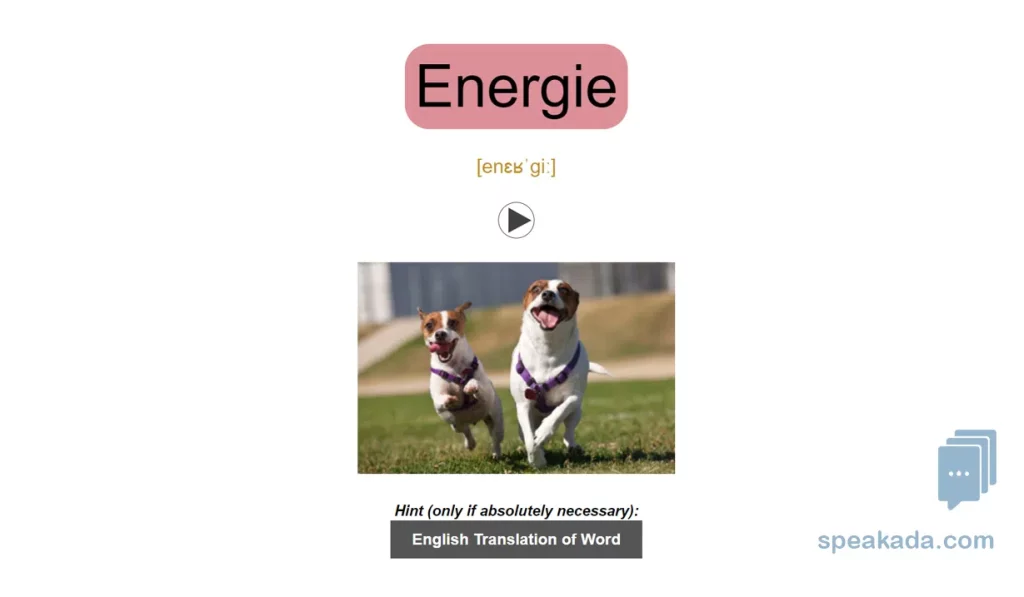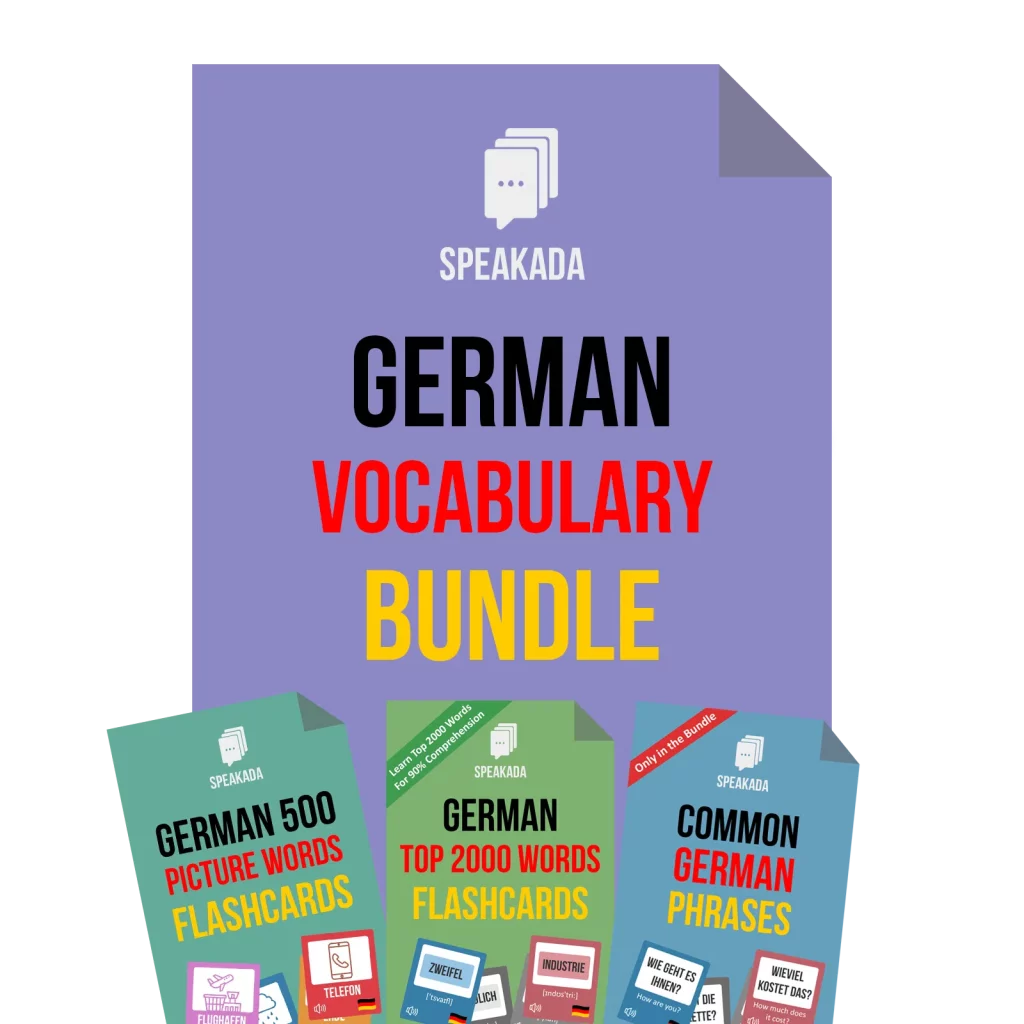
WHAT IS THE GERMAN VOCABULARY BUNDLE?
The German vocabulary bundle is a set of the essential Anki flashcards to learn German vocabulary.
Based on scientific research from linguists Michael Lewis, James Milton, Stephen Krashen and Paul Nation, the German vocabulary bundle will help you reach 90% German comprehension and A2 CEFR (vocabulary) level.
Receive a discount by buying all 3 flashcard decks now. You’ll learn the German 500 Picture Words, German Top 2000 Words and Common German Phrases (only available in the bundle).
WHAT GERMAN WORDS SHOULD I LEARN & WHY?
If you’re a beginner German learner, then you should first learn words that give you the highest yield for your time and effort. This means that you should learn German words according to word frequency. “Word frequency” refers to how frequent or how often a given word is used in a certain language. We believe that this the most efficient way to learn German vocabulary.
In the German language alone, there are already tens of thousands of individual words that you could potentially learn. This is very overwhelming! According to Deutsches Wörterbuch (1961), there are at least 330,000 German words that you could learn. But when we analyze the frequency of each of those words in speech, books and other media, we realize that not every word has the same value for learning.
Just think about how you use your own native language. You only use a small amount of available words in your daily life. On the other hand, you ignore the majority of words that are in the dictionary. In fact, you may not even use or know thousands of words in the dictionary of your own native language. For example, if you’re an English native speaker, you’ve probably never heard of the words “kakorrhaphiophobia”, “ulotrichous” or “impignorate”, but these are English words found in many English dictionaries.
The principle of “word frequency” applies the same to the German language, too. Therefore, as a German beginner, you’ll want to learn words that appear most frequently in day-to-day use by native German speakers. Paul Nation, a world-renowned vocabulary acquisition linguist researcher from Victoria University of Wellington, emphasizes the need to use word frequency lists as guidelines to study vocabulary in a foreign language. If you learn about 2000 most frequently used words in a foreign language, then you’ll be able to understand 90% of the language as it is spoken in normal life, according to research.
In addition, Linguist James Milton from Swansea University found that if you learn about 2000 words, you are likely to pass the A2-level CEFR language exam. The CEFR refers to the Common European Framework Reference for Languages, and passing the A2 level means that you will pass beginner German, to get you comfortably into the intermediate levels of German.
HOW DO I LEARN THE MOST COMMON GERMAN VOCABULARY?
If you’re a German beginner, and you want to pass the A2 CEFR level and get 90% comprehension, then you’ll need to learn German vocabulary according to word frequency. This is a good idea, but you probably want a clear plan for how to actually do it.
So, we made is easier for you by breaking down German vocab learning into 3 stages for beginners. First, learn words using picture-based flashcards. Secondly, learn words using sentence-based flashcards. Thirdly, learn the most common German phrases. All 3 stages will help build your German vocabulary step-by-step.
1. Learning Words with Picture-Based Flashcards
The first step is for you to learn the most common German words (verbs, nouns and adjectives) that can be easily visualized with an image. We suggest starting with picture-based words because you’ll find that it’s a fast and even fun way to learn the easiest German words. Learning picture-based words allows you to tap into your visual long term memory, too.
A research study from MIT (Massachusetts Institute of Technology) found that long-term memory is capable of storing a massive number of objects with details from the image. Participants were shown pictures of 2,500 objects over the course of 5.5 hours. It was found that participants were able to successfully maintain detailed representations of thousands of images in their memory. If you apply the same idea to learning German vocab, then you can focus first on learning the most frequent words that can be easily learned using an image.
In addition, you no longer rely on English language translations of the words. This is beneficial because you build stronger connections between the new German word and the actual concept of the thing. You skip English translations altogether so that you can think faster in German only. Our German 500 Picture Words Flashcards are all picture-based German words that take advantage of the benefits mentioned above.
2. Learning Words with Sentence-based Flashcards
The next stage of learning German vocabulary is to learn sentence-based words using the context of example sentences and monolingual definitions. In order to be able to speak and understand German, you will need to learn the 2000 most common German words, including abstract words, that cannot be visualized. Therefore learning using images only would no longer be as effective. You need to start creating meaning in your own mind by understanding German direct from sentences.
As you become familiar with German words, you want to start to transition into German-only content. We do this by using the idea of “chunks”. Linguist Michael Lewis emphasized that if you want to learn a language, then you need to understand sentence “chunks” of the language. It’s not enough to learn words on their own.
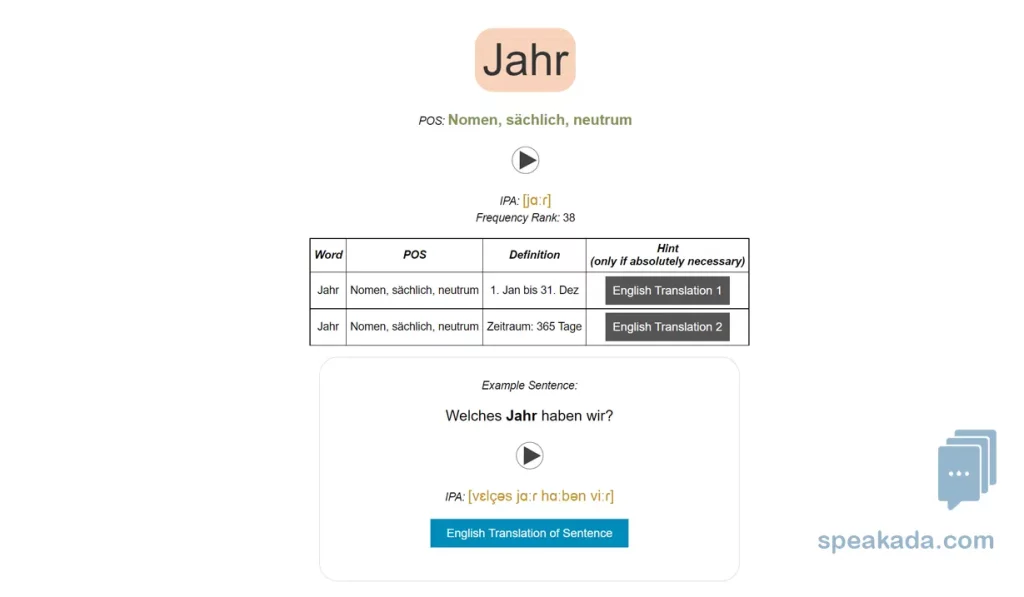
While the linguist Stephen Krashen put forward the “input hypothesis”. Krashen states that learners progress in their knowledge of the language when they understand language input that is slightly more advanced than their current level. That is why you should focus on acquiring new German words step-by-step in the context of real German sentences and basic German monolingual definitions.
Our German 2000 Words Flashcards are all sentence-based with monolingual definitions that take advantage of the benefits mentioned above. The German sentences only include words that are found in the 500 picture words deck and the 2000 words deck.
This means that you will learn from German “chunks” and gradually build upon your vocab knowledge with each new flashcard.
3. Learning Common German Phrases
After learning the 2000 most frequent words, you are estimated to reach the German A2 CEFR level, along with 90% comprehension of texts. You will be able to understand German but may still find it difficult to produce German sentences to communicate with German speakers in common, everyday contexts.
Being able to put the words together to form sentences quickly in different situations may not come naturally, particularly if you have not learned German grammar. This is why the next logical step is to learn the most common German phrases. If you learn the most common German phrases, this will allow you to transition to grammar easily and build your confidence when speaking in German.
Linguist Paul Nation found that, similar to his research on the most frequently used words in a language, there are also frequently used phrases in languages. If you learned these common German phrases, then it would be very helpful in real life situations. For example, you could use these phrases when speaking to native German speakers on the phone, via email, or when meeting them for the first time. The phrases are useful when visiting a German-speaking country and you want to speak to a native speaker at the airport, taxi and other transport, hotel, restaurant, shops, tourist spots and more!
Our Common German Phrases Flashcards are based on linguist Paul Nation’s research, along with our own improvements. It includes the top 100 German phrases that you can use in a variety of contexts so you can speak with confidence abroad, get what you want and express yourself clearly. It will also help you avoid awkward and embarrassing situations with native speakers because you’ll know what to say.
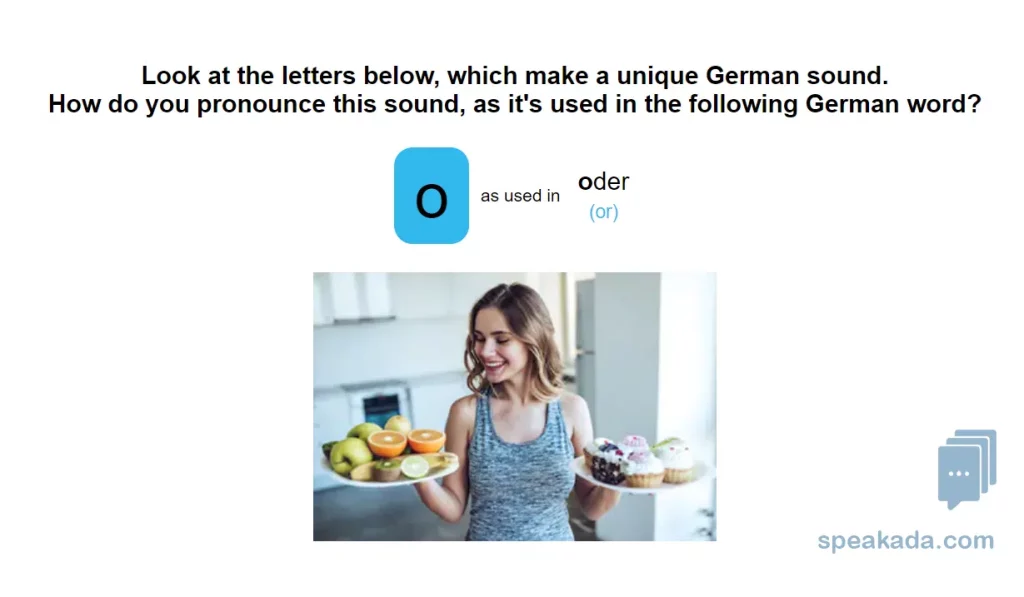
WHAT IS INCLUDED IN THE GERMAN VOCABULARY BUNDLE?
The Anki German vocabulary flashcards bundle includes all 3 digital flashcard decks for Anki you’ll need to learn German vocabulary and reach 90% comprehension. The 3 flashcard decks included are:
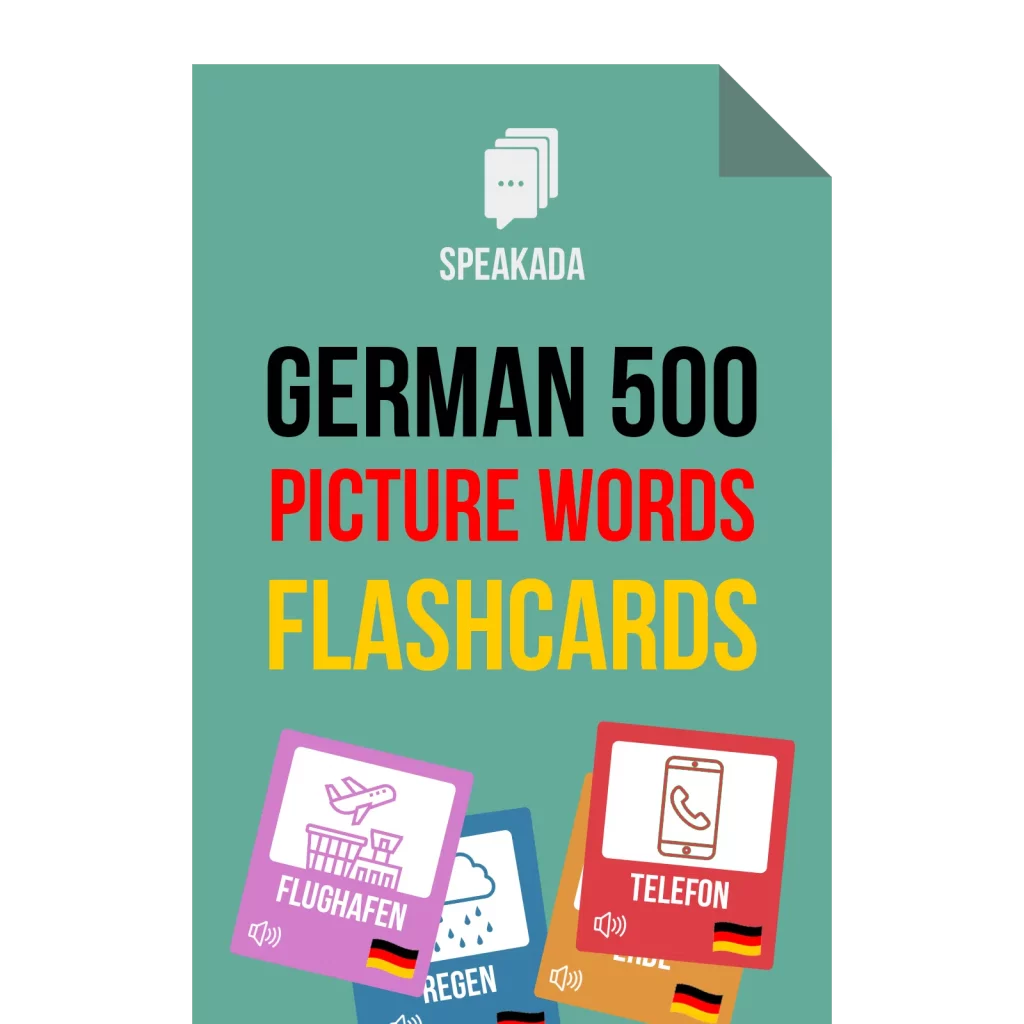
Harness your visual long term memory to learn 500 picture-based words with images and audio.
Learn More
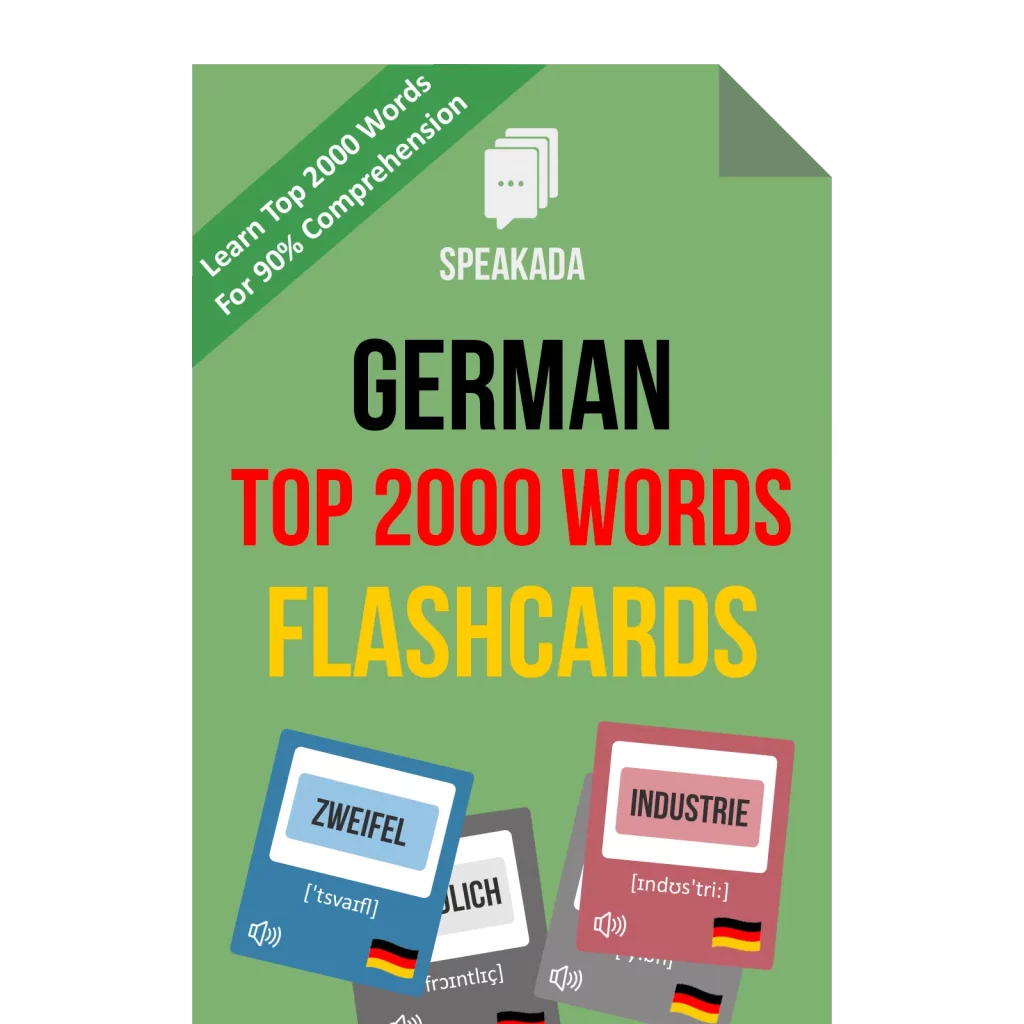
Learn the top 2000 German words using example sentences and reach 90% comprehension.
Learn More
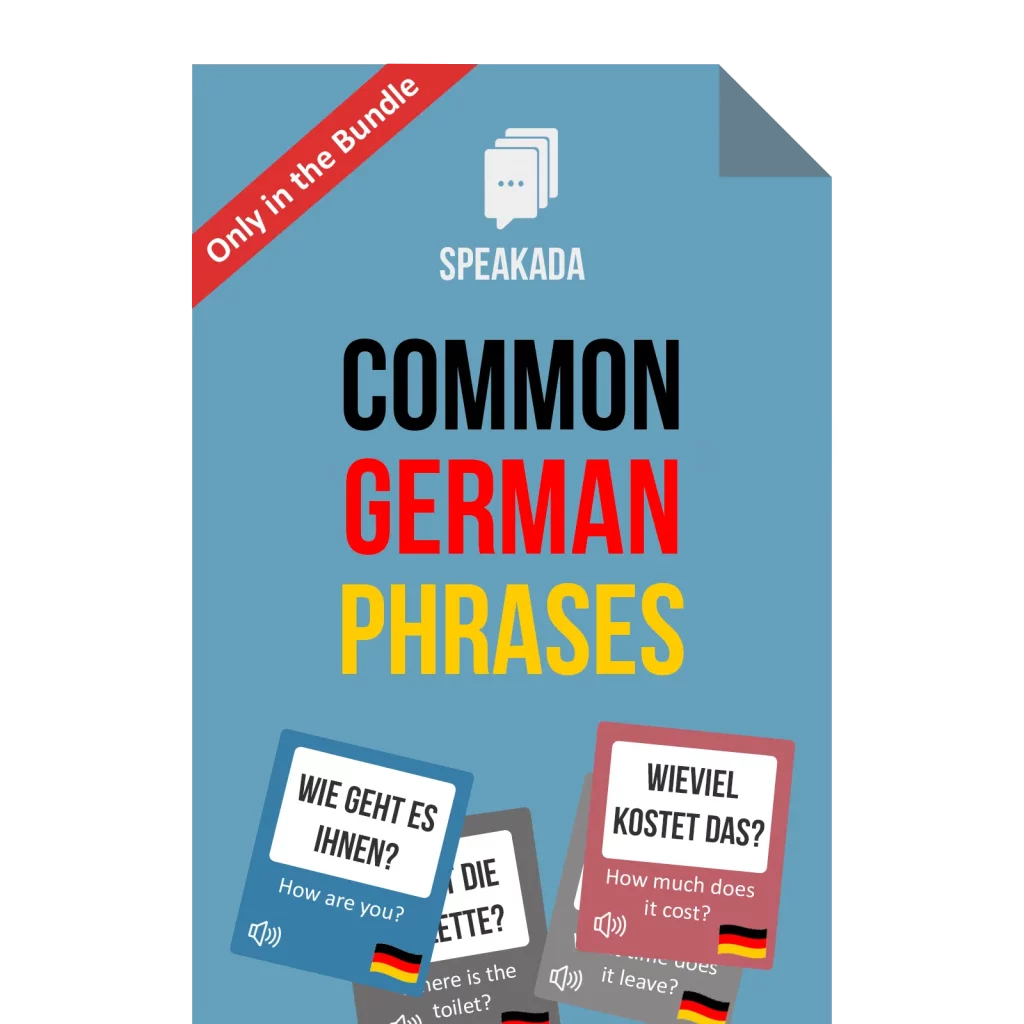
Learn the most common German phrases to form sentences and converse in German.
Learn More
TESTIMONIALS
Hear from the hundreds of language learners who use our Anki decks and love them!
“Speakada uses diverse methods of teaching and learning, from visual to vocal, which all makes it easy to learn.”

(International trade diplomat & Language learner)
“I’ve been able to tweak my pronunciation, reducing the mistakes I make & increasing my memory of new words.”

(Corporate Tax Specialist & Language learner)
“Speakada motivates me by adapting to my schedule. I can learn in my own time. Now language learning is more fun.”

(Emergency medical doctor & Language learner)
“Thanks to Speakada I was able to save hours making flashcards and instead, focus on learning with confidence.”

(Business lawyer & Language learner)
YOUR PURCHASE IS SAFE

Your purchase is safe. All credit card information is processed on a secure server by a trusted payment service provider, such as Stripe. If you buy and receive our product, but it is significantly different from our original description on our website, then simply email us within 7 days to request a refund.

